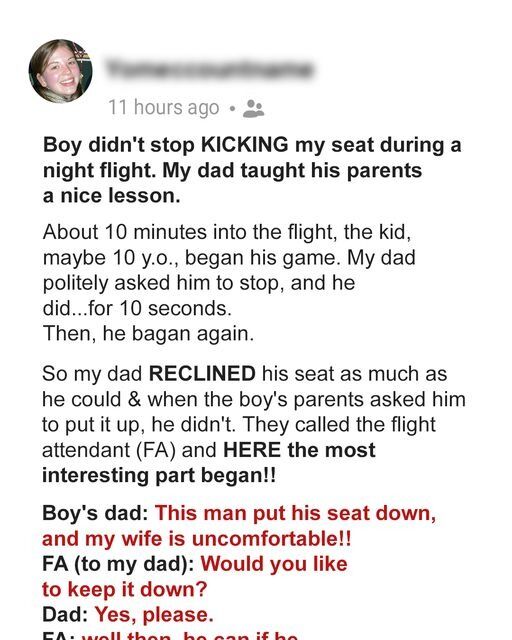It was supposed to be an easy flight home — just a few quiet hours in the air. But halfway through, what started as a gentle tap on the back of my seat turned into constant, rhythmic kicks that made it impossible to relax. I turned around and saw a young boy happily swinging his legs, completely absorbed in a game on his tablet. His parents sat beside him, unfazed, as if nothing was wrong. I tried to ignore it, but after the fifth kick in a minute, even my dad, who’s one of the calmest people I know, had enough.
At first, he handled it like any reasonable traveler would. He leaned back and politely asked the boy’s parents if they could help him stop kicking. They smiled and promised to take care of it — and for a few peaceful minutes, they did. But then the thumping started again, harder this time, like a small drumbeat behind my back. I could see the frustration in my dad’s face, though he never raised his voice. Instead, he leaned back slowly, took a deep breath, and came up with a plan so quietly clever I almost laughed.
Without saying another word, Dad reclined his seat all the way back — directly into the lap of the boy’s mother. She gasped and immediately complained, calling over a flight attendant. When she insisted that he move his seat forward, the attendant checked, smiled politely, and said, “Ma’am, he’s allowed to recline his seat.” The woman fell silent. Within moments, the kicking stopped completely. The rest of the flight was perfectly peaceful.
As the plane began its descent, my dad looked over and said with a grin, “Sometimes, people only understand when they feel what they’ve caused.” It wasn’t revenge — it was a lesson in empathy. No shouting, no scene — just calm, quiet justice at 30,000 feet. And to this day, whenever someone complains about rude passengers, I think of that flight and how my dad proved that sometimes, the smartest response is the simplest one.
